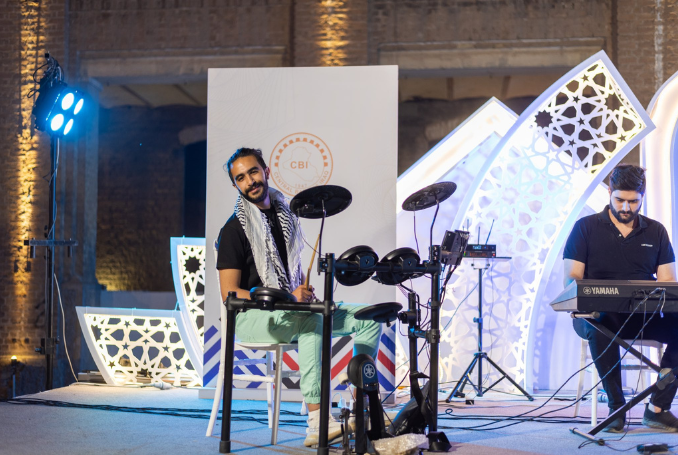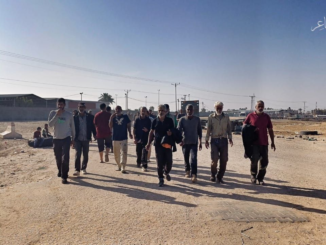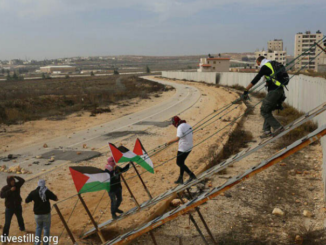
By Benay Blend
Palestine has long been home to resistance music, too. In Palestinian Music in Exile: Voices of Resistance (2023), Louis Brehony chronicles the history of Palestinian music in refugee camps close to Palestine, as well as in Gaza and the ’48.
In the early 1960s, I boarded a train along with other young people headed to a Jewish leadership camp in the state of Georgia. Halfway there we were nearly thrown off for singing “We Shall Overcome,” a theme song of the civil rights movement.
Once there some of us participated in a protest in front of a segregated laundromat located near the camp. At night we sang songs associated with “Israel’s” foundation led by a Hasidic rabbi. At that time I did not understand the contradictions between following the civil rights movement here while supporting Zionist nationalism there.
By the early 1980s, students at the University of New Mexico, where I went to graduate school, were involved in the movement against apartheid in South Africa as well as opposition to the US-funded dictatorships in Latin America.
As Ramzy Baroud observes, “the most genuine and practical solidarity with the Palestinian people will always come from the Global South.
Practically, this means that while we must continue our advocacy and pressure on Western governments, we should invest in rooted and long-term alliances with Global South governments, civil societies, and any political, legal, academic, or social structure that would allow us to obtain and offer solidarity to our comrades in the Global South. This is not just a long-term strategy but one that can immediately bear fruits, because strong bases for solidarity already exist.”
In these movements, music plays a role. Through the freedom songs of South Africa; the folk music of Victor Jara in Chile; and freedom songs in the U.S., activists began to see a global movement, what would now be called intersectionality.
On February 18, 1979, Jara’s widow, Joan Jara, folksinger Pete Seeger, and the Chilean group Quilapayun participated in a Tribute to Victor Jara. There I first heard of the revolutionary singer who was murdered by Pinochet’s junta in 1973.
Along with hundreds of other students and faculty from a nearby university, the military brought Jara to Estadio Nacional where he was tortured to death. After soldiers cut off his fingers, his body was thrown into a morgue along with hundreds of other bodies who died that day at the hands of Pinochet’s regime.
Recently, Zionist soldiers turned a stadium in Gaza into a mass detention camp where they stripped men and children, and carried out field executions, causing many people to remember Chile’s national stadium, where Pinochet’s goon squad stripped Salvadore Allende’s supporters before shooting and torturing them to death.
The words “no hay revolución sin canciones” (“no revolution without songs”) are those of former Marxist president of Chile Salvadore Allende who was murdered in the US-backed 1973 coup d’état against the Chilean revolution and Allende’s government. They signify the relationship between the political revolution and the cultural revolution, a connection that the late Palestinian writer/revolutionary Ghassan Kanafani knew quite well.
Assassinated by the Mossad in Beirut, Lebanon in 1972, Kanafani believed that culture played an important role in revolutions. Whether Jarar became a revolutionary through production of his own music, or vice versa, is not important. What matters is that his music aided the presidential campaign of Salvadore Allende, and, despite the coup, Jara’s revolutionary legacy lives on.
In 2021, journalist Vijay Prishad declared Jara’s song “el derecho de vivir en paz” (“The Right to Live in Peace”) an anthem for these times. Walking around the Plaza de la Dignidad in Santiago, Chile, Prishad saw images of Jara and quotes from his music painted on the walls.
A Chilean song written for the Vietnamese revolution, Jara’s words remain an inspiration for revolutionary as well as a testament for the internationalism of his music. Indeed, his songs could apply as well to Palestinians today who, like the Vietnamese, are fighting against US-backed Israeli imperialism.
On the 83rd day of the Zionist war on Gaza, Abu Obeida, spokesman for Al-Qassam Brigades, the military arm of the Palestinian Resistance Movement, Hamas, clarified the internationalism of the Palestinian struggle. “Every nation on earth that has been occupied has wrested its freedom through blood, body parts, and combat,” he explained. “We have the best evidence and proof in Vietnam, Afghanistan, South Africa, Iraq, Algeria, Lebanon, and others.”
In her review of the documentary Songs for Freedom: Amandla! A Revolution in Four-Part Harmony, Marie Jorritsma, a white South African woman, explains that “the revolution in South Africa is the only revolution anywhere in the world that was done in four-part harmony,” explains Abdullah Ibrahim, South African musician and composer.
“Song is something that we communicate to the people who otherwise would not have understood where we were coming from,” activist Sifiso Ntuli adds. “You could give them a long political speech and they would still not understand, but I tell you, when you finish that song people be like I know where you guys are coming from. Death unto apartheid.”
“The struggle becomes the song and the song becomes the struggle,” Jorritsma concludes. Recently, it was South African lawyers who brought the case of Israeli genocide before the International Court of Justice (ICJ), and argued the cause of Palestinians.
Palestine has long been home to resistance music, too. In Palestinian Music in Exile: Voices of Resistance (2023), Louis Brehony chronicles the history of Palestinian music in refugee camps close to Palestine, as well as in Gaza and the ’48. “Palestine is itself a site of exile” (p. 3), Brehony states, due to displacement after the Nakba.
In chapter 6, Brehony discusses Reem Anbar’s musical career. Born in Gaza City, where she learned to play the oud, Reem, along with her husband Louis, founded Gazelleband, based in Manchester, England.
Although Reem Anbar has left Gaza to “navigate new situations of exile,” her “stor[y] lead[s] back to Palestine, and to intense formative years of creativity and social solidarity” (169). She relates that she uses the oud to “speak,” to “write a message” (P. 184): “I’m Palestine and I exist [mawjuda] through my music” (p. 184). In this way, she writes her music into the story of a country that Israel denies existence.
Reem’s brother, Fares Anbar, also is a musician. At one time he was a percussionist with the Gaza-based Sol Band, but Israeli bombs forced him to flee with many others to Rafah, now a city of Palestinians who went to what they thought was a “safe zone,” until it became “Israel’s new battlefield” in its campaign of ethnic cleansing.
Attesting to the rootedness of his music, Anbar writes: “I promise you, that if I am not martyred, my bandmates and I will continue to dedicate my music to every citizen of Gaza for the rest of my life.”
“Today, there is no longer that kind of clarity in the left about the nature of our fights and the need for international solidarity,” Prishad explains. “Where there should be a straightforward defense of the people’s right to chart their own agenda,” he says, there is instead a delegitimization among some segments of the left regarding armed struggle as one of many paths towards the peoples’ freedom.
“The right to live in peace is not a meaningless phrase,” Prishad concludes, “it is effectively a challenge to the system now managed by people such as Biden, Modi, Piñera, and others.”
Taking up the challenge, Jara’s words continue in the works of internationalist, anti-imperialist composers of today. For example, after leaving Palestine in 1967 for Sweden, George Totari formed the band Kofia, composed of other Palestinians and leftist Swedish musicians. The opening words of their first album-“Fire on the Zionists, imperialists and reactionaries”- regaled against Israeli Zionists and European ruling classes.
More recently, Totari posted on Facebook a song dedicated to the six-year-old Hind Rajab, the child who disappeared on January 9th after Zionist soldiers attacked the car that she was riding in with members of her family. Translated by Reem Abdelhadi, the song ends with Totari’s desire for Hind to live in a world “where there are no bombs” and “there is no hate,” words that recall Jara’s call for the right to live in peace.

– Benay Blend earned her doctorate in American Studies from the University of New Mexico. Her scholarly works include Douglas Vakoch and Sam Mickey, Eds. (2017), “’Neither Homeland Nor Exile are Words’: ‘Situated Knowledge’ in the Works of Palestinian and Native American Writers”. She contributed this article to The Palestine Chronicle.







